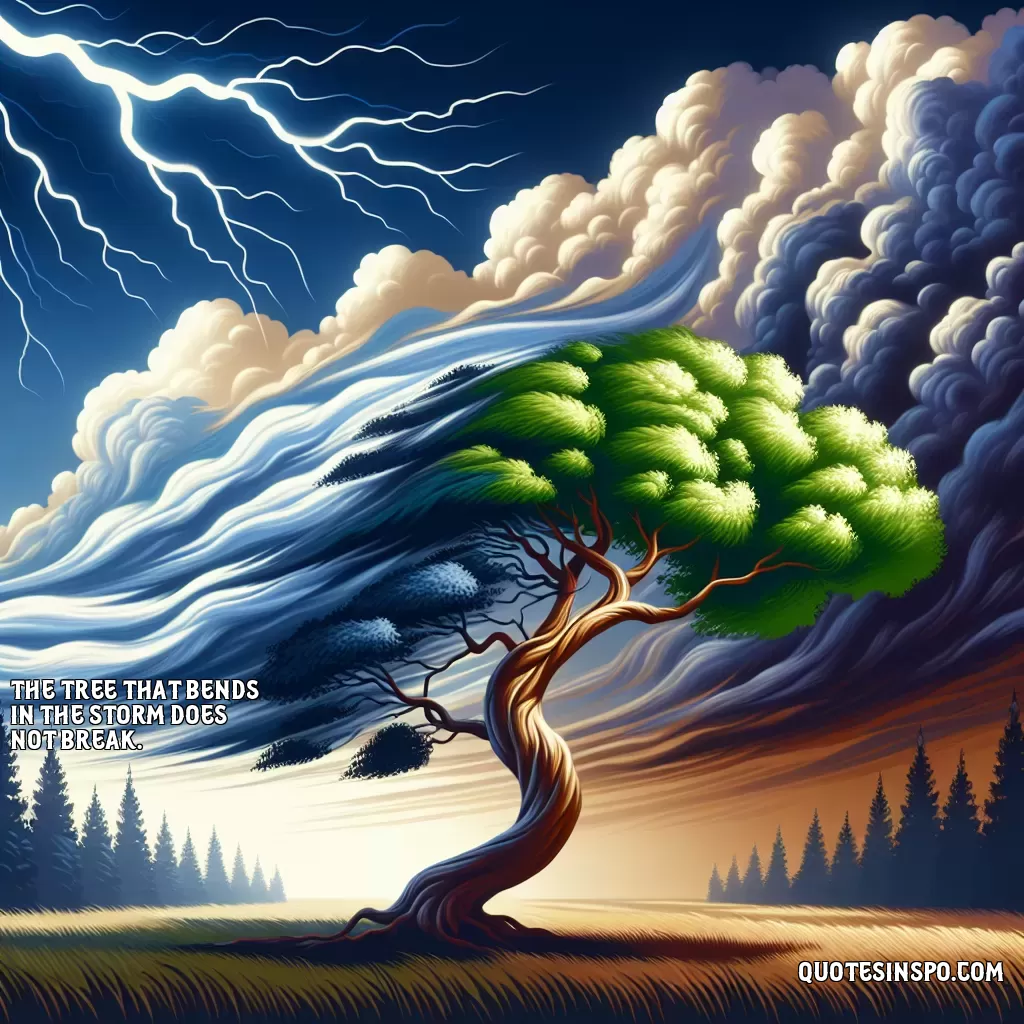
The tree that bends in the storm does not break.
The quote "The tree that bends in the storm does not break" provides a powerful metaphor for resilience and adaptability in the face of adversity. It suggests that those who are flexible and can adapt to changing circumstances are more likely to endure challenges without succumbing to them. In nature, trees that can bend with strong winds tend to survive storms, while rigid trees that resist the force are more likely to snap. This natural phenomenon illustrates the broader principle that flexibility is a key component of strength. Applied to human experience, the quote encourages individuals to adopt a mindset that allows for change and adaptation during difficult times. Flexibility here doesn't imply weakness; rather, it demonstrates a form of strength that enables survival and growth amid turmoil. By bending, the tree is not surrendering to the storm but rather employing a strategy for survival. Similarly, individuals who maintain an open and adaptable approach are more likely to navigate life's inevitable challenges successfully. Moreover, the quote highlights the importance of resilience, which is the ability to recover from setbacks and adapt to new circumstances. Resilient people are those who, like the bendable trees, manage to keep their core intact and their spirits unbroken even when faced with fierce storms. Such resilience is vital in personal growth and in maintaining mental and emotional well-being throughout life's unpredictable journey. Thus, the quote serves as a reminder of the value of flexibility, adaptability, and resilience.
Quote By: James M. Barrie
James M. Barrie was a Scottish novelist and playwright, best known for creating the beloved character of Peter Pan. Born on May 9, 1860, in Kirriemuir, a small town in Angus, Scotland, Barrie was the ninth of ten children in a family of modest means. His early childhood was marked by the tragic death of his older brother David, which had a profound effect on him and would later inspire themes of loss and the passage of time in his work. Barrie's formative experiences influenced his imagination and led him to develop a fascination with childhood and the extraordinary.
Educated at the University of Edinburgh, Barrie initially pursued a career in journalism before finding his passion for writing plays and novels. His early works included "Better Dead" (1891) and "The Little Minister" (1891), but it was his play "Peter Pan, or The Boy Who Wouldn’t Grow Up" that would ultimately define his legacy. First performed in 1904, "Peter Pan" tells the enchanting story of a boy who can fly and never ages, along with the adventures he shares with Wendy Darling and her brothers in the magical world of Neverland. This timeless tale captivated audiences and established Barrie as a major figure in children's literature.
Throughout his career, James M. Barrie wrote several other plays and novels, including "Margaret Ogilvy" (1896), a semi-autobiographical work that pays tribute to his mother. In addition to being celebrated for his literary contributions, Barrie was known for his wit and charm, qualities that endeared him to his peers in the literary community, including luminaries such as Sir Arthur Conan Doyle and H.G. Wells.
Barrie remained dedicated to the themes of youth and imagination until his death on June 19, 1937. His influence on literature and theater is profound; "Peter Pan" continues to permeate popular culture, inspiring countless adaptations in film, musicals, and more. James M. Barrie’s legacy endures, reminding us of the magic of childhood and the importance of cherishing innocence in a world that inevitably demands growth.